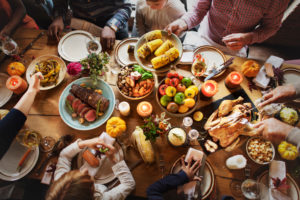 For many Americans, November hails the beginning of the holiday season—a time packed with secular and religious traditions. For most, that means they will be packed with another staple: food. From Thanksgiving dinner gatherings to Hanukkah and Christmas feasts, it seems most celebrations taking place center on getting folks together and eating. For those of us who either struggle with an eating disorder or know someone who is, these times can be riddled with anxiety, fear, shame, and other distressing emotions. As we prepare to gather around our holiday tables, let’s challenge ourselves to make the weeks ahead less disordered and more celebratory, regardless of our personal eating struggles.
For many Americans, November hails the beginning of the holiday season—a time packed with secular and religious traditions. For most, that means they will be packed with another staple: food. From Thanksgiving dinner gatherings to Hanukkah and Christmas feasts, it seems most celebrations taking place center on getting folks together and eating. For those of us who either struggle with an eating disorder or know someone who is, these times can be riddled with anxiety, fear, shame, and other distressing emotions. As we prepare to gather around our holiday tables, let’s challenge ourselves to make the weeks ahead less disordered and more celebratory, regardless of our personal eating struggles.
This year, let’s remove morality from our plates. We’ve all heard it before: “I’m going to be bad and have a second piece of pie!” Are we truly saying we are bad if we have a second slice? Or using whole milk in our potatoes? Or having potatoes to begin with? If we unpack that statement enough, we can start to see how ridiculous it is to equate our personal value with the foods we eat. While this concept has its roots from way back in the puritan era, it seems safe to say it’s one “tradition” we can do away with (Steim & Nemeroff, 1995; Coveney, 2006). If you find yourself getting pulled into the morality trap, try finding something you appreciate about the food instead—the way it’s presented on your plate, the texture it has in your mouth, the care and time it took for a loved one to cook it, and yes, even the way you enjoy the taste.
This year, let’s not make comments on others’ food choices. It’s highly common to hear comments about the amounts of food on each other’s plates. From jokes about “already” going back for seconds, to guilt-tripping pleading to “just have a little more,” it seems like around a holiday table everyone’s choices are up for discussion. For anyone who struggles with food, this can be a major trigger and is highly likely to be misinterpreted regardless of the speaker’s intentions. What’s being said, like it or not, is the mixed message of “haven’t you had enough/why aren’t you eating?” This is a close cousin of the morality trap in that the person is being judged by what they are, or are not, putting into their mouth.
A basic rule at many eating disorder treatment centers is to ex-nay the food talk. It’s a great boundary to have in place for everyday meals, especially around the holiday table. Caregivers, parents, and support people might want to consider stating the rule ahead of time and inform others who may not be aware someone is struggling with food that no food comments (other than “Wow, that’s delicious!”) will be permitted—and follow through. Those in recovery might want to consider asking for this rule to be implemented beforehand. Remind others this small step can remove pressure from everyone and allow the attention to be refocused on other things: gratitude for the family present, perhaps, or appreciation for having plenty.
While we’re at it, let’s also not make comments on bodies this year. I’ve written about this before, but body talk is damaging and reduces an individual to their external casing.
While we’re at it, let’s also not make comments on bodies this year. I’ve written about this before, but body talk is damaging and reduces an individual to their external casing. While it may be difficult to refrain from remarking on a changed physical appearance, especially if you haven’t seen the person for some time, challenge yourself to focus on function over form. This means inquiring about what they’ve been up to or discussing behavioral observations rather than looks. Are they more open today, have they gained friends, are they excelling in that new job? Sending a message that a person’s value is outside of their physical appearance can be very healing for all involved.
This year, let’s be sure to have some regular mealtimes, even on the actual holiday. It can be tempting to “save up space” by not eating until the appointed feast time. This is called restriction in the world of eating disorders and can be triggering, not to mention rather unhealthy as it essentially teaches us to ignore the body’s hunger cues. Having set mealtimes that adhere to some sort of regular schedule can also be helpful for those who struggle with food because it sends a message that feeding our bodies remains a priority, regardless of circumstance. It also helps to continue the pattern of normalizing food intake. By all means have that turkey feast, but make sure to have some breakfast and lunch as well.
This year, let’s avoid the compensatory talk. It never fails that around the holiday season gym goers, coworkers, and even family members jump on the compensatory train. Statements such as, “I’ve got to earn that turkey” or “I’m going to pay for that slice of pie later” equates exercise with punishment and sets up a dangerous precedent that one can enjoy food only if the body has been properly restrained (Rosenfeld, 2015). Striving for a balanced life is, after all, what many of us are after, and believing or even joking about compensating for food intake is giving voice to unhelpful thoughts of what food will do to our bodies. We can alleviate some of this anxiety by simply not engaging in this kind of errant talk. Challenge yourself to exercise for the physical health benefits and to honor your body’s needs for movement, and try to see food intake as honoring your body’s equal need for energy, nourishment, and pleasure.
Finally, this year let’s set some time aside to NOT focus on food. The holidays are about so much more, and by fixating on one meal, we reduce the time we spend together to simply the time we spend eating together. Feeling that our entire time with loved ones is summed up by one meal increases the pressure around it. Instead, try writing down what you would like your time with family to look like. What do you see yourself doing and enjoying? Include some downtime or personal time as well. Giving yourself permission to not see every family member or friend can be just as important to having a balanced and healthy holiday season.
Challenge accepted (I hope)! Please see the resources below for more tips on how to engage in a food-positive and healthy holiday season.
- Dear Melody: How Can I Talk to My Child About Their Eating Disorder?
- Thanksgiving with an Eating Disorder: 10 Tips to Help You Enjoy the Holiday
References:
- Coveney, J. (2006). Preface. Food, morals and meaning: The pleasure and anxiety of eating. (2nd ed.). New York and London: Routledge.
- Rosenfeld, S. (2015). Thanksgiving Goodness Without the Guilt. Retrieved from https://www.nationaleatingdisorders.org/blog/thanksgiving-goodness-without-guilt
- Steim, R. I., & Nemeroff, C. J. (1995). Moral Overtones of Food: Judgments of Others Based on What They Eat. Society for Personality and Social Psychology, 21(5).
© Copyright 2017 GoodTherapy.org. All rights reserved. Permission to publish granted by Mandy Beth Rubin, LPC, GoodTherapy.org Topic Expert
The preceding article was solely written by the author named above. Any views and opinions expressed are not necessarily shared by GoodTherapy.org. Questions or concerns about the preceding article can be directed to the author or posted as a comment below.

 Why Positive Behavioral Change Is a Better Goal Than Weight Loss
Why Positive Behavioral Change Is a Better Goal Than Weight Loss Eating Disorder Recovery: Coping with Bumps on the Winding Path
Eating Disorder Recovery: Coping with Bumps on the Winding Path Who Could Have an Eating Disorder? Short Answer: Anyone
Who Could Have an Eating Disorder? Short Answer: Anyone